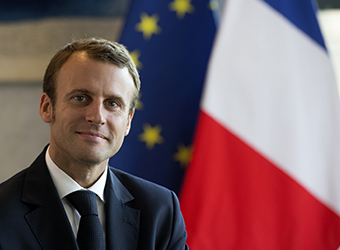As French President Emmanuel Macron wrapped up his first official visit to China, there are signs that Beijing’s relationship with Europe is shifting.
The French politician’s first official visit to China is notable for coming as other leaders of the Western world struggle domestically. In fact, Macron appeared as “perhaps the leader of Europe at this very moment” said Philippe le Corre, a research fellow at the Harvard Kennedy School.
British Prime Minister Theresa May, who herself has a China trip set for the end of January, continues to face questions about Brexit and her own leadership; Germany’s Angela Merkel is struggling to form a coalition; and the U.S. is facing political turmoil under Donald Trump’s administration.
For his part, Macron is “clearly eyeing” a “special strategic partnership” with China, said Alicia Garcia-Herrero, chief economist for Asia Pacific at French bank Natixis, pointing to China’s consumers grow hungrier for what France has to offer.
During his campaign, the French leader took a “slightly negative” approach to China by pushing for a European-level investment protection agency, but that development seems to have lost ground, Garcia-Herrero said.
Instead, Macron appears to be taking a different angle with China.
“Macron seems to have come to the realization that he had better be on the right side of the table under China’s divide and conquer strategy in Europe, i.e. a more accommodating stance towards China,” she wrote.
As much as Macron is wooing China, Beijing is also reaching out to Europe through its ambitious Belt and Road Initiative that aims to connect Asia, Europe, the Middle East and Africa with a vast logistics and transport network.
For China, France’s pivot to closer ties could be beneficial for its overall standing in Europe: A “divide and conquer” strategy will help diversify its power, as sentiment toward the East Asian giant turns sour in Germany, Garcia-Herrero added.
That shift comes as China is now producing more of its own machinery and automobiles instead of importing them from countries like Germany — and it’s now even competing with the European powerhouse in third markets, she said.
Macron pursued business, downplayed deals
Over his three-day visit, Macron pursued business interests with China, but he also pushed for a reciprocal trading relationship.
That came as many in Europe are debating about the implications of Chinese investments in the continent, particularly in infrastructure and higher technology.
“At the end of the day, Europe is very open. It’s more open than the Chinese market itself. Reciprocity is the key word, really. That’s what Emmanuel Macron was trying as a message to convey to [Chines President] Xi Jinping,” le Corre told CNBC.
On Tuesday, Macron offered to open France to Chinese investment in exchange for greater access to China’s markets for French companies, Reuters reported.
“We have an access to markets which is unbalanced, unsatisfying,” Macron told members of the French and Chinese business community at an event in Beijing, Reuters reported.
“If we don’t deal with this responsibly, the first, natural, reaction will be to close up on both sides,” he said. “Let’s open up both instead.”
On Wednesday, Macron said a contract with China for 184 Airbus A320s would be finalized soon, Reuters reported.
The French leader downplayed the lack of other big deals during his visit, saying other countries had trumpeted big figures in the past that masked more modest realities.
Source: Reuters


